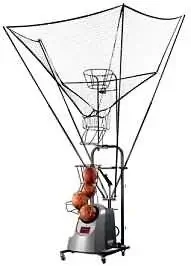4 Ways To Be An Effective Basketball Coach in the Off-Season
By Nick Bartlett, Dr. Dish BasketballFrom the Coach’s Clipboard Basketball Playbook
"Helping coaches coach better..."
This coaching article was submitted by Nick Bartlett of Dr. Dish Basketball, makers of the Dr. Dish Shooting Machine.
The off-season represents a lull in on-the-court action for basketball teams, but that doesn't mean that opportunities for growth end there. While there are restrictions on off-season practice for most high school and college teams, basketball coaches can still encourage their players to think about the previous season and how they plan to put themselves in a better position for the next season.
Dedicated coaches don't stop teaching when the season is over: they encourage players to look at basketball from a new vantage point by bringing their players together, discussing strategy, and encouraging personal responsibility.
Establish Consistent Communication
Meetings offer an opportunity to bring the team together and keep players thinking about basketball, even when practice is not in session. These meetings are best held at regular intervals: potentially once a week or sometimes even every other week.Understandably, players and coaches are balancing other responsibilities: coaches often teach as well or have additional jobs, athletes in high school become involved in other sports or college preparation, and college athletes sometimes face professional prospects. In the wake of all that comes next, remind players and fellow coaches that they are still part of the team.
Make sure all the coaches and players have a chance to talk, and let everyone know about deadlines, events, and what your plans are going forward. Another easy way to stay in contact with your team is through emailing, texting, and occasional one-on-one meetings. Players will take note of your efforts and will trust their coaches if they see genuine interest in their activities in the off-season.

Informal team meeting
Review the Previous Season and Discuss the Next Season
This topic is connected to meetings, but while meetings answer the "when" and "where" of team get-togethers, setting an agenda for the off-season addresses the "why" and "how." Analysis of the previous season often entails watching video, analyzing results, and talking about overall trends as well as narrowing discussion to specific plays or games. It's important for coaches to have statistics and discussion points ready so players know what they did well, what to improve upon, and what to expect for next year.While coaches deserve some time to rest just like the players, gathering data and conversation points is best done near the beginning of the off-season, while the season is still fresh. Maybe your team had fantastic three-point shooting, some of the best in your division. That's worth addressing. It would also be important to discuss what other aspects of the game could complement your team's shooting.
Starting off with your team's strong points is encouraging and sets an optimistic tone, but addressing areas for improvement is important too. If rebounding was poor, that aspect of the game merits special consideration. And don't forget the why. Maybe your team had strength, but positioning problems were largely the result of poor performance on the boards. There's room for analysis. Statistical knowledge is important in looking toward a bright future, but after that comes discussing why those statistics exist, correcting for bad habits, and capitalizing on what worked well.
Promote Personal Responsibility
A good image in sports goes beyond good sportsmanship and team leadership. Those are tremendous qualities on the court, but athletes with a stellar image also represent themselves well off the court. During the off-season, coaches should emphasize the need for players not to lose track of their role as students. Not only must athletes meet academic standards in order to remain eligible to play, academic performance for high schoolers determines their college prospects. Studying, volunteering, and living a clean personal life sets athletes up for the next level of play and earn them respect. From their own personal conduct, coaches influence their players so make sure to lead by example. Starting off meetings with a positive attitude passes on a contagious optimism. Avoid bad-mouthing opponents and emphasize your own team's commitment to success in order to set and reach lofty standards.Innovate & Utilize Technology
A coach can offer tremendous insight during practice, in the off-season, in meetings, and group discussions. However, coaches can't be there all the time, and even when they are, having assistance from reliable sports equipment & technology eases pressure. That's where state-of-the-art basketball shooting machines from Dr. Dish can really enhance your off-season without you needing to be in the gym 24/7. Keep you players accountable by assigning them specific goals and tracking them directly on the Dr. Dish Academy Database.Whether it's the regular season, pre-season, or even the off-season, a coach's job never truly ends. However, it can be made easier with technology that promotes accountability, offers statistical feedback, is designed for outside & post-training, increases repetitions, and is the lightest yet most durable of its kind.
While it is important to rest and reflect in the off-season, it's also important to stay involved and keep your program headed in the right direction. Communicating clearly with your team is essential and we at Dr. Dish are happy to help your program in any way we can!
Related pages:
